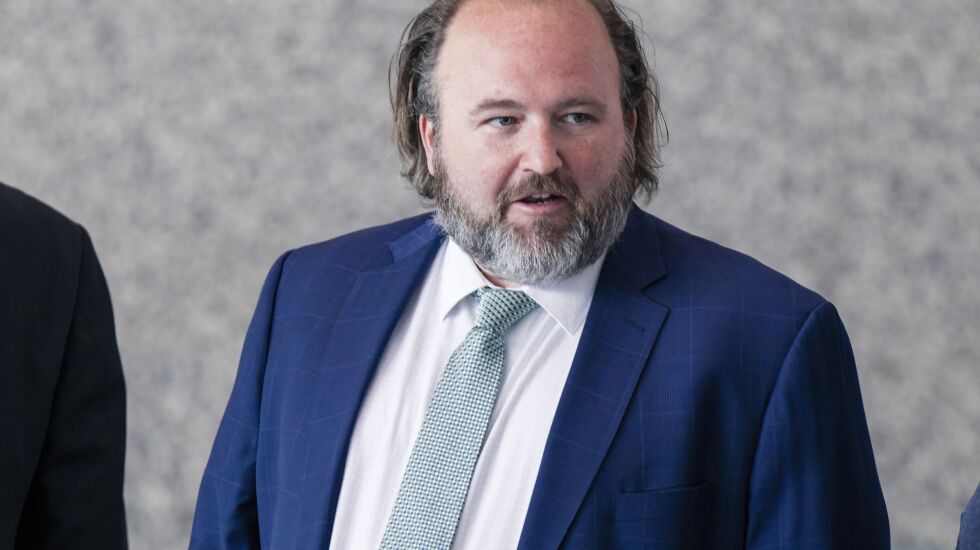
Businessman James T. Weiss is accused of bribing two state lawmakers to push legislation in Springfield, but it was Chicago politics that took center stage as his corruption trial neared its end Tuesday.
The focus turned from the state capitol to City Hall, with testimony from former Ald. Patrick O’Connor (40th) and Sam Toia, president of the Illinois Restaurant Association. It revolved around Weiss’ claim that he had not bribed then-state Rep. Luis Arroyo, but rather paid him to help block an ordinance O’Connor had proposed.
Along the way, jurors heard O’Connor acknowledge that, after he left office in May 2019, he was paid $5,000 a month for four months by gambling kingpin Rick Heidner, who had hired him as a consultant. O’Connor acknowledged that he sometimes looked things up for Heidner, but the work was “nothing dramatic.”
Defense attorney Ilia Usharovich even asked O’Connor whether he was “getting $5,000 a month from Heidner for doing absolutely nothing except for standing by or being available?”
“Correct,” O’Connor said.
O’Connor had expected his deal with Heidner to last longer, but Heidner wound up calling him to say plans had changed. That would have been around the time Heidner’s name surfaced in documents related to a federal search of the state capitol that fall. The feds later confirmed in a letter that Heidner was “not a target” of the investigation.
Usharovich asked O’Connor whether he thought Arroyo had sent Ald. Gilbert Villegas (36th) to kill the ordinance O’Connor had proposed. It would have banned unregulated gambling devices known as sweepstakes machines in the city. O’Connor earlier explained that a competing ordinance, which would have clearly legalized them, undermined O’Connor’s proposal.
“It was my belief at the time that the competing ordinance was not something that Ald. Villegas came up with on his own,” O’Connor said.
When testimony ended for the day, U.S. District Judge Steven Seeger told jurors that prosecutors would likely rest their case Wednesday morning.
Though Weiss’ defense team had seemed unlikely to call any witnesses, their plans seemed up in the air Tuesday.
Whether Weiss will take the stand even seemed to be an open question. Weiss is a son-in-law of former Cook County Assessor Joseph Berrios.
Weiss is accused of paying $32,500 in bribes to Arroyo, a Democrat, to push legislation related to sweepstakes machines in the General Assembly. When the legislation didn’t pass, the men allegedly offered bribes to then-state Sen. Terry Link, another Democrat.
Weiss’ lawyers deny he was involved in the effort to bribe Link. And they say the payments to Arroyo were legitimate consulting fees paid to help block O’Connor’s proposed ordinance.
Arroyo has admitted taking bribes from Weiss and is now serving a nearly five-year prison sentence.
Prosecutors told jurors in the trial’s opening statements that any efforts to block ordinances at City Hall had ended by fall of 2018. Meanwhile, jurors on Tuesday saw 11 checks paid by Weiss’ business to Arroyo’s that were written between Nov. 1, 2018 and Oct. 1, 2019.
The feds first charged Arroyo, and confronted Weiss about the scheme in late October 2019.
Toia testified Tuesday that his organization promoted electronic devices in restaurants, including sweepstakes machines. He said he worked as a consultant for Weiss in the city around the time that O’Connor proposed his ordinance. And he acknowledged to Assistant U.S. Attorney Sean Franzblau that he was “not thrilled” to be on the witness stand.
Toia went on to testify that his work for Weiss didn’t end until the fall of 2019. That prompted a challenge from Franzblau, who noted that Toia had previously told the feds his work ended in late 2018 or early 2019.
“You understand that you’re under oath?” Franzblau said.
Toia stuck by his story. But he also told jurors that Weiss never told him Arroyo had been working for him as a lobbyist.
O’Connor then took the stand and explained the sweepstakes ordinance he’d proposed in July 2018. He said it was discussed at a committee meeting in October 2018, but no vote was taken because people were anticipating the competing ordinance.
O’Connor said the competing proposal was filed in November 2018. He said neither proposal went anywhere, though. And to the best of his knowledge, the related lobbying ended late in 2018.
Usharovich then used his cross-examination to accuse O’Connor of trying to “create a case” that would go to a high court and clarify the legal status of sweepstakes machines, which have been described as existing in a “gray area” of the law.
O’Connor countered that he “didn’t have to create anything” because people were already using sweepstakes machines to gamble.
“I held meetings to determine whether or not we could make successful arrests to bring about a case that could be appealed to the appellate court,” O’Connor testified.







